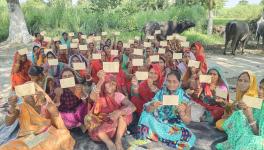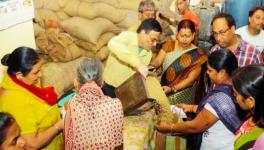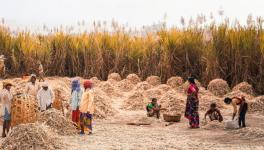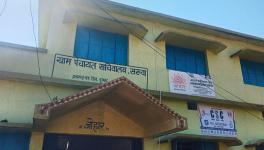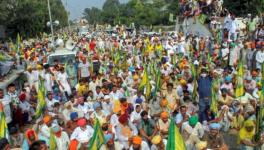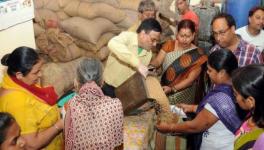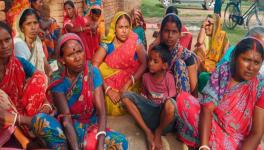Jharkhand: People Continue to Die of Hunger, Officials in Denial Mode
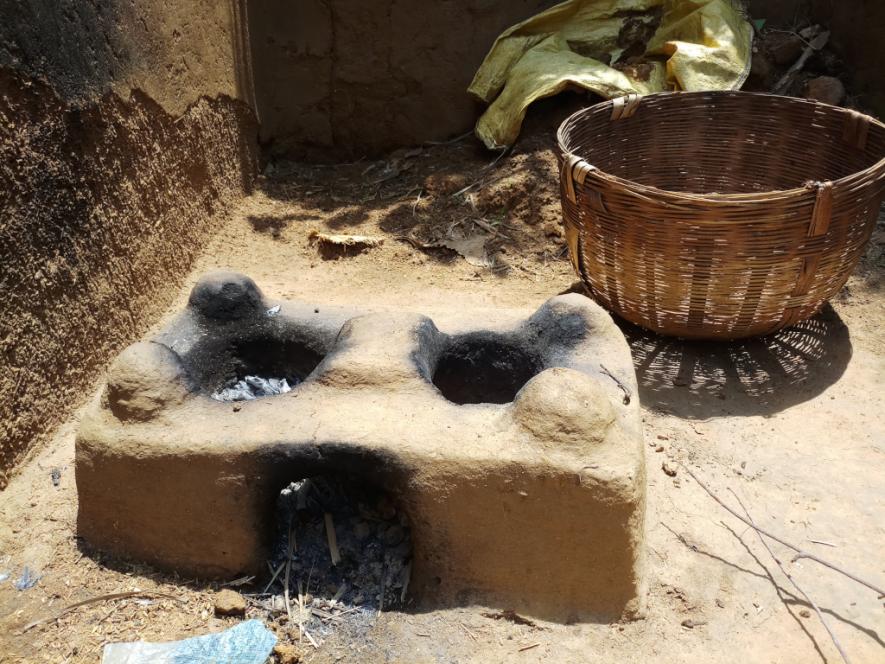
Ranchi (Jharkhand): While Digital India, bullet trains and space missions make news in Delhi, Jharkhand has a different problem — hunger. Starvation, an unfortunate reality of the 21st century, has emerged as a silent killer in the state. But, for the government, there is nothing called starvation deaths.
As the administration continues to deny the starvation deaths, NewsClick travelled across Jharkhand to understand how starvation has afflicted the entire state. From Giridih to Godda to Dumka to Rajmahal, hunger destroying families was clearly visible.
Motka Majhi, Dumka: When Rice Came After Death
Motka Majhi, a tribal belonging to the Maal Pahadia community breathed his last in the state allegedly because of hunger on May 22. Maal Pahadia is one of the 75 tribal groups which has been categorised as Particularly Vulnerable Tribal Groups (PVTGs). The PVTG are the most marginalised sections of the Scheduled Tribes in India.
Majhi, a 50-year-old daily wage labour, was residing in Uper Rengani village in the Jama block of Dumka. According to Hindi daily Dainik Jagran, he had not been getting work since the implementation of the Model Code of Conduct (MCC). For a fortnight, Majhi had been surviving on Taadkun (toddy palm) fruit. Following his death on May 22, Manjhi’s wife Alawati Devi and son Sunil Manjhi performed his last rites. Majhi is survived by two other sons, who are poor daily wage labourers.
Also read: Jharkhand Tribal Allegedly Dies of Hunger
The Hindi daily also quoted villagers as saying that there was no ration in his house when Majhi died.
The family, while talking to reporters, also claimed that they neither had a ration card nor Mahatma Gandhi National Rural Employment Guarantee Act (NREGA) job card. They were yet to be sanctioned a home under Prime Minister’s Awas Yojana. They added that Majhi used to work at a brick kiln, but had not been getting work since the implementation of MCC.
The village head, Rajendra Yadav, immediately after Majhi’s death, reportedly provided 15 kg ration to the family. Block Development Officer (BDO) Sadhu Charan Deogam, too, has reportedly sent 10 kg rice to the family. However, he claimed that the in-laws of the deceased were in Ramgarh, another block in Dumka, where they had gone to cast their vote. They had a pink card which entitles every member of the family to get 5 kg ration every month.
Kaleshwar Soren, Dumka: He Sold a Tree For Some Food
Kaleshwar Soren, a 45-year-old widower of Mahuatanr village, Jama block, Dumka, allegedly died of starvation on November 11, 2018. He lived alone, in extreme deprivation, in a dilapidated kutcha (mud) house — which consisted of two bare rooms. The first one had a wooden cot where Kaleshwar slept. The second room was in a dilapidated state. A part of the roof had crashed in, and the tiles lay on the ground in one corner. Except the wooden cot, there were no other possessions — no utensils, clothes or anything else.
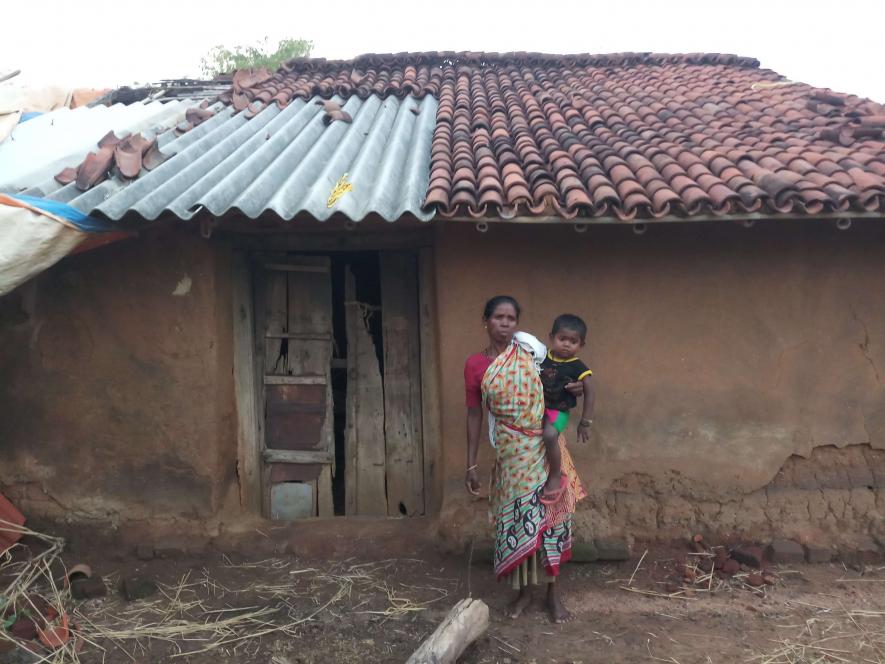
He is survived by his five children — four boys, Arbin (20), Sarbin (18), Santosh (17), Mantosh (8) and a girl, Manisha (7). His wife had died a few years ago due to snake bite. The neighbours said this two other daughters had also died in childhood.
Kaleshwar had mortgaged the family’s 3-4 bighas of land to someone in the village long ago. The family did not get any share in the paddy cultivated on those lands. He had also sold off their pair of oxen when he needed some money. The family did not have any livestock. Kaleshwar sold off a Palash tree to Budhlal Marandi a couple of months ago for Rs 250 and 1.5 kg of rice.
Also read: 12 Die Of Hunger In 10 Months, Jharkhand Government In Denial: Right To Food Campaign
According to the neighbours, Kaleshwar was last seen on November 10 last year. When he did not come out of his house till the next day, the neighbours went inside to check on him. They found him dead.
The Block Development Officer, Circle Officer, mukhiya (village head) and other officials visited the family and paid Rs 5,000 for conducting the last rites. The village head gave four blankets, a plastic sheet to cover their broken roof and 50 kg rice. The villagers did not allow the officials to take the body for post-mortem.
Santri and neighbours said that Kaleshwar did not have any illness. “He used to work in a local brick kiln as a daily wage labourer. However, he had quit working a couple of years ago as he had damaged one of his legs while repairing the roof of his house a few years ago. He had also grown weak in the last couple of years because of unavailability of food and nutrition,” he told NewsClick.
Owing to the persistent lack of food at home and unavailability of any means of earning, all his children had to leave home in the early part of their childhood or migrate in search of work. Santosh works in Mandi, Himachal Pradesh, as a daily wage labourer in a road construction company. He earns Rs 350 a day. But he has to pay a commission to the contractor from his earning.
Arbin and Sarbin migrated to Rajasthan as daily wage labourers a couple of years ago and could not attend their father’s funeral because their contractor did not allow them any leave and kept their wages unpaid. They did not go back to work after they came home, months after their father’s death and are now working as daily wage labourers in Dumka.
The younger sibling Mantosh rears cattle (bagaali) in a village in Masaliya block of Dumka, while Manisha has been adopted by the local Jharkhand Mukti Morcha leader who has taken her to Ranchi for studies.
Santri said Kaleshwar’s first priority always was food and therefore, from whatever he got from his children or neighbours, he always bought rice for survival.
Also read: In the Absence of Aadhaar, Starvation Deaths Continue in Jharkhand
“Food was always scarce in the family. Things became worse after the death of Kaleshwar’s wife. He could manage only rice and saag or potato (at times). Dal (pulse) was rarely cooked,” one of the neighbours said.
The household – according to a fact-finding report by Right to Food Campaign – had a Priority Household ration card (202003406853), issued under the National Food Security Act (NFSA), that was cancelled sometime in 2016 as it was not linked with Aadhaar. The family had received rations for a few months in 2016 before it was cancelled.
“Kaleshwar’s ration card was amongst the 28 cards of the village that were cancelled in 2016 as they were not linked with Aadhaar. Ration cards of all these households, except Kaleshwar’s and Jean Kisku’s, were issued again after a year once the Aadhaar card and passbook copies were submitted,” said the report, which further added that the local dealer, who runs the ration shop, confirmed that the family’s ration card was cancelled. The dealer had also confirmed that another ration card was not issued as Kaleshwar did not submit his Aadhaar and bank account details, the former being a mandatory requirement for the card.
He further stressed on the fact that Aadhaar is a “must”, failing which no ration can be provided. “Sab kuch aadhaar ka khel ho gaya hai, aadhaar nahi hoga toh kuch nahi hoga (Everything now depends on Aadhaar, nothing is there in its absence),” he said.
Notably, the family still does not have a ration card.
According to village head Sukhlal Soren, Kaleshwar had also got a sanctioned house under the Indira Awas Yojana long back. But his house has been lying incomplete and the scheme has closed since then. Even though he said that he did not know about the details of the scheme as it was implemented before his term (which started in 2016), he shared that it could not be completed as some middleman may have siphoned off the money.
At least five households of the village still don’t have ration cards. Ration card of Jean Kisku, who lives with his wife, was also cancelled in 2016 due to unavailability of Aadhaar. Another ration card has not been made for the family since then for the same reason.
“We are living in extreme deprivation and do not get enough to eat. Following repeated requests and applications to the mukhiya (village head), we were once taken to Dumka for recording of biometric identifications necessary for UID card issuance. But the machines were not working that day. We could not go there the next time on our own as we are illiterate and don’t know official processes,” he said.
Jean somehow manages his livelihood by selling liquor along with his wife on road side and in local weekly markets. There are several other eligible households who do not have ration cards – Parmeswar Tudu, Sewantu Tudu, Johan Kisku, Ravinder Chowde and Chhoti Hansda.
Most of the cardholders do not have ration cards. They are given ration on the basis of the list at the dealer’s shop. The dealer said that he is yet to receive ration cards for the households from the marketing officer.
Several cardholders complained that the dealer cuts around 400 grams from each person’s grain entitlement. For example, 1.5-2 kg from 25 kg rice entitled to a family of 5 persons. Sometimes, fingerprints of some family member does not work in the Aadhaar-based Point of Sale (PoS) machine. In that case, another member has to go to try authenticating his/her fingerprint and collect the grain. The dealer said that the exemption register was to be used only if fingerprints of none of the members of a cardholder’s family worked in the PoS machine and he never had to use it.
The villagers said that no National Rural Employment Guarantee Act work happened in the village in 2018 or 2017. One of the persons said that an irrigation well scheme was implemented in 2016. They complained that even though they wanted to work under NREGA, the scheme was not implemented in their village. They also said that some people had applied for social security pensions but were yet to be enrolled in the pension scheme.
Lukhi Murmu, Pakur: No Food For One Week
Lukhi Murmu (30), a resident of Dhawadangal village at Ghagharjani Gram Panchayat in Pakur district’s Hiranpur tehsil, died on January 23, 2018, after starving for over a week, prolonged weakness and inadequate nutrition. She was not getting ration (rice) under the PDS since October 2017 because of Aadhaar-based biometric identification mismatch. She allegedly sent her youngest sister – Phulin Murmu – to the local dealer several times but was always denied rice.
Also read: Jharkhand Deaths: Has Aadhaar Played a Role?
But the administration maintains that Lukhi died of illness, not hunger.
Eldest among five sisters, Lukhi never married in order to look after her sisters. Their parents died about 11-12 years ago. Three of Lukhi’s sisters – Rani Murmu (20), Talamalay Murmu (25) and Ansu Murmu (18) – are married. Their youngest sister – Phulin (14) – lived with Lukhi. All the sisters except Phulin are illiterate. Phulin was studying in Kasturba Gandhi Girl’s School, Hiranpur, however, she was forced to leave studies when she was in standard seven because her family was unable to pay fees. But after Lukhi died, the district administration swung into action and got her admitted in the school.
Lukhi’s household has about 15 decimal of land (mostly upland). It is sowed with paddy only when Lukhi’s sisters’ husbands plough the land. It yields about half a quintal of rice. Lukhi and Phulin were wage labourers. During the agricultural season, they got work for about three days a week. They received Rs 100 and a meal for a day’s work. They last worked in December 2017. Lukhi last worked in NREGA before 2016.
She lived in a kutcha house on about 3 decimal land. The deceased owned two cows and two bank accounts. In one of them, she had taken a Kisan Credit Loan of Rs 14,000 in 2013. This account has a balance of Rs 196. There were no entries in the passbook of the second bank account. She had also taken a loan of Rs 200 which remained unpaid.
She used to take small loans regularly as well which she returned by working for the lender’s household. The deceased was not part of any self-help group.
She died at about 4:30 PM on January 23, 2018. In the absence of rice, no food had been cooked in her house for one week. “She had asked to lend her some rice. I had given her 10 kg of rice 15 days before she died. Once it got finished, she did not ask for more out of self-respect,” Kalidas Hembrum, one of her neighbours, told NewsClick.
She died after Phulin was once again denied rice by the local dealer who always insisted Lukhi to come for biometric authentication which the deceased could not do due to her illness, he said.
The BDO and Medical Officer visited their household after the death. The BDO gave around 100 kg of rice and a blanket.
The deceased, as her neighbours said, did not have any major illness. “She was weak for a couple of year, but her condition deteriorated around last Durga Puja. She used to tire easily after doing manual labour. She was also very worried about her sisters’ future. She used to seek medical treatment from the local doctor (registered medical practitioner) who she was unable to pay regularly. She had lost considerable weight over the past few months. On January 6, 2018, she was taken to the local community health centre for the doctor’s prescription. She was then tested for tuberculosis and kala-azar (visceral leishmaniasis) in January 2018, but they were both negative. She took the medicines prescribed by the doctor, but there was no improvement in her health,” one of her neighbours said adding that “lack of adequate food and nutrition contributed to her death”.
Lukhi’s household was initially issued an Antyodaya ration card (number 202001407489) under the National Food Security Act. This card was later converted into a Priority Ration Card. The card includes the names of Lukhi, Phulin and two of their other sisters.
As per the information available on Jharkhand Government’s PDS website, said a fact-finding report by the Right to Food Campaign, the Aadhaar number is linked with their ration card. “Lukhi’s household received 35 kg grain per month till April 2017, with some missing entries in the preceding months. The household received 20 kg of grain per month from June to September. She was unable to access the PDS grain. It seems that the deceased was unable to go to the ration shop due to weakness. The ration shop is about a kilometre away and requires an uphill climb,” said the report.
Also read: 42 Starvation Deaths in 2 Years, Campaign Demands Food for Everyone
Dhawadangal is a village of 40 households. It is 6 km away from Hiranpur block and 3 km from the Gram Panchayat office. The closest Public Health Centre and bank is in Hiranpur. An all-weather road connecting the village to make commute during the rains easier was being constructed when this correspondent visited the village.
Few households in the village still do not have a ration card. Also, names of several people are missing from their ration card. As per people in the village, the dealer did not distribute any grain in May 2017. This was confirmed from the entries of four other ration cards of the village. A few cardholders said that the dealer gives only 32 kg instead of the sanctioned 35 kg of rice.
Upel Murmu was unable to get grain for two months due to biometric failure. People also complained that the dealer does not give the printed receipt. They said that he distributes rice and kerosene on separate days and refuses to give ration to households who do not come on the day of distribution of ration.
The fact-finding report also alleged that, “No household in the village has its Job Card. Some Job Cards may be with the local contractors. No NREGA work took place in 2017. In 2016, some land levelling and pond construction took place, but at least some of this work was through machines. The village has one self-help group which is not active. Hiranpur is an “intensive block” of Jharkhand State Livelihood Promotion Society, the state National Rural Livelihood Mission.”
Ruplal Marandi, Deoghar: No Fingerprint, No Ration
Ruplal Marandi, a 62-year-old villager of Bhagwanpur in Mohanpur block of Deoghar district in Jharkhand, allegedly died of hunger on October 23, 2017. However, the investigating team of the Block Development Officer Ashok Kumar and accompanying doctors declared it a natural death.
The deceased was living with his daughter Manodi Marandi. According to her, there was nothing at home to eat for over a week and they did not receive any rice from the ration shop in the two months (September and October) prior to his death. The ration dealer, Dharmdev Choudhary, had refused to give ration because the fingerprint was not working in the biometric machine.
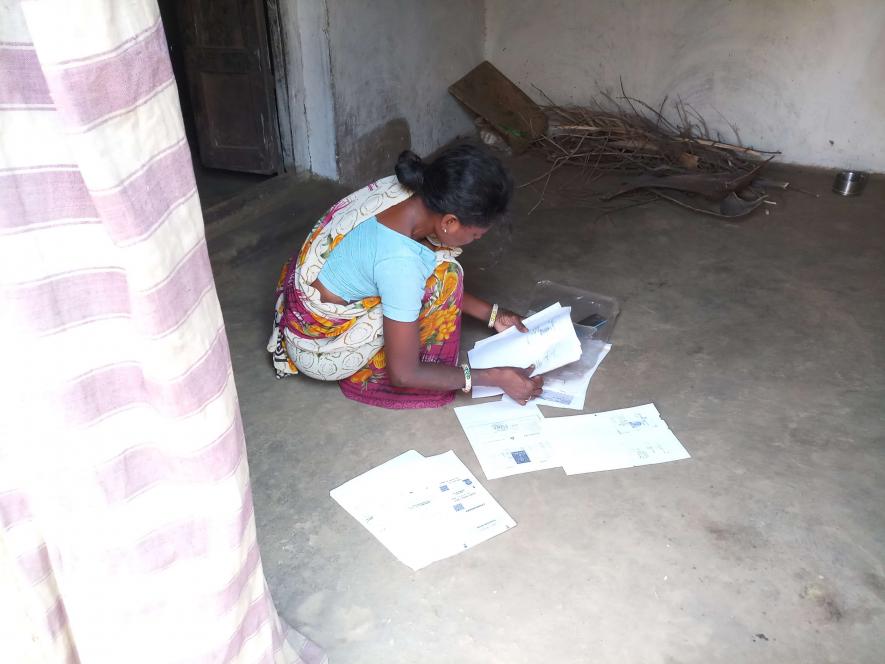
Manodi said that whatever she earned from daily wages was their only means of living. She did not get any work for five-six days due to Diwali and incessant rain, as a result of which they did not have any money. She remembered, “For two days, we did not light the hearth because there was nothing to cook. There was some puffed rice (mudhi) at home, which we were surviving on. My father’s condition deteriorated with hunger and he passed away.”
Despite an uproar, the administration never acknowledged it and maintains that it was a natural death due to disease. “Therefore, we did not get the post-mortem done. How could we trust doctors who were part of the administration, which was trying to bury the issue,” Naval Kishore Hembrum, a retired school teacher in the village, told NewsClick.
He said nobody dies of hunger so easily but starvation makes them weaker, aggravating the problems they are suffering from. “Ruplal was bed ridden and was unable to walk after he had suffered a fracture in the waist due to a fall. His health condition was deteriorating day by day because of hunger. He was not even getting old age pension,” he said.
The deceased was living in a kutcha (mud) house as he was not allotted funds under the government’s housing scheme. Even after his death, the district administration, alleged Hembrum, is so insensitive that it still has not given a house to the deceased’s family. The deceased daughter, who is a widow, is also not getting old age pension.
Also read: Even After 18 ‘Starvation’ Deaths, Jharkhand Govt Continues to Remain in Denial
Unofficial reports suggest Jharkhand has so far witnessed 18 starvation deaths since 2017. The recent deaths of Santoshi Kumari in Simdega, and Baidyanath Das, a rickshaw puller in Dhanbad, were also allegedly due to food shortage at home.
Improper implementation of the National Food Security Act and frequent failure of the complex Aadhaar-based biometric authentication (ABBA) system in the PDS are depriving many poor families of food rations that are essential for their food security. The facts indicate that all these deaths are due to hunger and undernutrition, but the government is denying this and citing other causes. This is a camouflage of the government departments to disown responsibility and avoid accountability.
Get the latest reports & analysis with people's perspective on Protests, movements & deep analytical videos, discussions of the current affairs in your Telegram app. Subscribe to NewsClick's Telegram channel & get Real-Time updates on stories, as they get published on our website.










